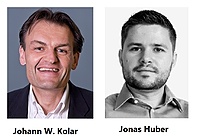Johann W. Kolar is a Full Professor and the Head of the Power Electronic Systems Laboratory at ETH Zurich, a Fellow of the IEEE, and an international member of the U.S. National Academy of Engineering. He has proposed numerous novel converter topologies and related control concepts, incl. the Vienna Rectifier and the Sparse Matrix Converter, has spearheaded the development of x-million rpm motors, and has pioneered fully automated multi-objective power electronics design procedures. The focus of his current research is on ultra-compact/efficient WBG converter systems, ANN-based design procedures, Solid-State Transformers, ultra-high speed drives, bearingless actuators, and life cycle analyses of power electronics converter systems.
Jonas E. Huber received the MSc (with distinction) degree and the PhD degree from the Swiss Federal Institute of Technology (ETH) Zurich, Switzerland, in 2012 and 2016, respectively. Since 2012, he has been with the Power Electronic Systems Laboratory, ETH Zurich, focusing his research interests on the field of solid-state transformers, specifically on the analysis, optimization, and design of high-power multi-cell converter systems, reliability considerations, control strategies, and applicability aspects. In 2017, he joined ABB Switzerland Ltd. as a Power Electronics Development Engineer working on high-power DC-DC converter systems for traction applications. After gaining some management experience with a Swiss utility company for a year, he then returned to the Power Electronic Systems Laboratory as a Senior Researcher in fall 2020.
